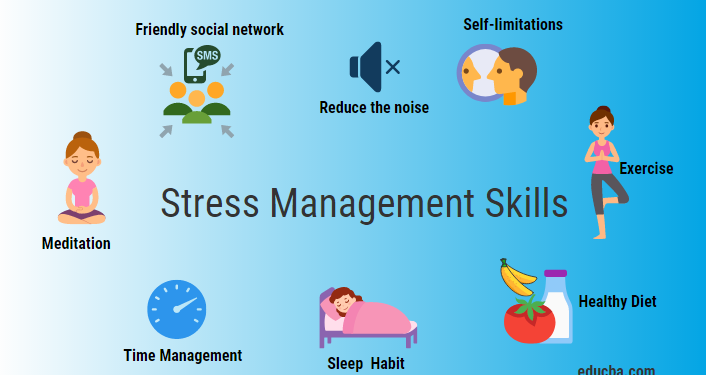In today’s fast-paced world, stress can often feel like an unwelcome companion, impacting both our mental and physical health. However, managing stress effectively is crucial for maintaining a balanced and fulfilling life. By incorporating practical techniques into your daily routine, you can master stress and foster a greater sense of well-being. Here’s a guide to some of the most effective methods for everyday stress relief.
1. Mindful Breathing
One of the simplest yet most powerful techniques for managing stress is mindful breathing. This practice involves focusing on your breath and using it to anchor yourself in the present moment. To start, find a quiet space, sit comfortably, and take slow, deep breaths.
Inhale through your nose for a count of four, hold for a count of four, and exhale through your mouth for a count of six. Repeat this process for a few minutes. Mindful breathing helps to calm the nervous system, reduce anxiety, and improve focus.
2. Regular Physical Activity
Exercise is a natural stress reliever and a cornerstone of stress management. Engaging in physical activity releases endorphins, which are chemicals in the brain that act as natural painkillers and mood elevators.
Aim for at least 30 minutes of moderate exercise most days of the week. Whether it’s a brisk walk, a yoga session, or a workout at the gym, find an activity that you enjoy and make it a regular part of your routine.
3. Healthy Eating Habits
What you eat can significantly affect your stress levels. Consuming a balanced diet rich in fruits, vegetables, lean proteins, and whole grains can help stabilize your mood and energy levels.
Avoid excessive caffeine and sugar, which can lead to spikes in anxiety and mood swings. Incorporate foods high in omega-3 fatty acids, such as salmon and walnuts, which have been shown to reduce stress and improve overall mental health.
4. Adequate Sleep
Sleep is vital for managing stress effectively. Lack of sleep can exacerbate stress and lead to irritability and decreased cognitive function. Aim for 7-9 hours of quality sleep each night.
Establish a regular sleep schedule by going to bed and waking up at the same time each day. Create a relaxing bedtime routine, such as reading or taking a warm bath, to signal to your body that it’s time to wind down.
5. Time Management
Effective time management can significantly reduce stress by helping you feel more organized and in control. Start by creating a daily or weekly schedule, prioritizing tasks, and breaking larger projects into smaller, manageable steps.
Use tools like calendars or to-do lists to keep track of deadlines and appointments. By staying organized and setting realistic goals, you can reduce the feeling of being overwhelmed and enhance your productivity.
6. Social Connections
Building and maintaining strong social connections is essential for stress management. Sharing your thoughts and feelings with friends, family, or a support group can provide emotional support and reduce feelings of isolation.
Engaging in meaningful social activities and nurturing relationships can also improve your mood and overall well-being. Don’t hesitate to reach out to others when you need support or simply want to talk.
7. Relaxation Techniques
Incorporating relaxation techniques into your daily routine can help manage stress and promote relaxation. Practices such as progressive muscle relaxation, guided imagery, and aromatherapy can be beneficial.
Progressive muscle relaxation involves tensing and then slowly releasing different muscle groups in your body to reduce physical tension. Guided imagery involves visualizing calming scenes or environments to soothe the mind. Aromatherapy uses essential oils to promote relaxation and reduce stress.
8. Hobbies and Interests
Engaging in activities that you enjoy and that bring you joy can be a great way to manage stress. Hobbies and interests provide an opportunity to focus on something positive and distracting, offering a break from daily stressors.
Whether it’s painting, gardening, playing an instrument, or cooking, make time for activities that you find fulfilling and enjoyable.
9. Setting Boundaries
Setting healthy boundaries is crucial for managing stress. Learn to say no to additional commitments that may overwhelm you, and prioritize self-care. Communicate your needs and limits clearly to others, and don’t be afraid to ask for help when needed.
Establishing boundaries helps you maintain a balance between your personal and professional life, reducing stress and preventing burnout.
10. Seeking Professional Help
If stress becomes overwhelming and unmanageable despite your best efforts, seeking professional help could be essential.
A mental health professional, like a therapist or counselor, can offer valuable support and personalized coping strategies. If you feel that stress is significantly affecting your quality of life, consider reaching out to a wellness center in Logan for expert guidance and support.
In Conclusion
Mastering stress involves a combination of practical techniques and lifestyle adjustments. By incorporating mindful breathing, regular exercise, healthy eating, adequate sleep, effective time management, strong social connections, relaxation techniques, hobbies, and setting boundaries into your daily routine, you can manage stress more effectively and enhance your overall well-being. Remember, managing stress is a continuous process, and finding what works best for you is key to leading a healthier, more balanced life.
